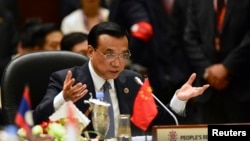Chinese leaders meeting at an annual summit of Asian leaders in Brunei are voicing fresh concerns over a possible default by the United States on its debt.
The official Xinhua news agency said Premier Li Keqiang told U.S. Secretary of State John Kerry on Wednesday that Beijing is "highly concerned" about Washington's debt ceiling problem.
A U.S. State Department official confirmed the conversation, noting that Li "briefly referenced" the issue. The official said Kerry insisted the fiscal impasse "is a moment in Washington politics" and expressed the White House's commitment to resolving the issue.
China is the largest foreign holder of U.S. government debt and has issued repeated warnings about the danger of a U.S. default.
Kerry is attending the summit in place of U.S. President Barack Obama after the U.S. leader was forced to cancel his Asia trip because of a budget dispute with Congress that has resulted in a partial shutdown of the government. The shutdown is still ongoing and has so far lasted nine days.
World markets have shown little reaction to the standoff over the shutdown, but many are concerned catastrophic global consequences could result if Congress and Obama cannot agree by next week to raise the government's borrowing limit.
President Obama's absence at the East Asia Summit and the meeting of the Association of Southeast Asian Nations that immediately preceded it have offered opportunities for China to compete for influence with the United States.
During meetings at both summits, Premier Li pledged to boost Chinese investment in the region. He also struck a conciliatory tone on China's long-running maritime disputes with several of its neighbors.
On Thursday, Li told the East Asia Summit that China will work for "positive, steady progress" on a long-delayed, legally binding Code of Conduct that aims to manage disputes in the South China Sea.
He also stressed that freedom of navigation in the energy-rich sea "has never been an issue and will never be one."
Some of China's neighbors accuse it of using bullying tactics in the South China Sea and have formed closer military alliances with the United States as a result.
China is reluctant to discuss the disputes at multinational forums such as ASEAN. Instead, it prefers dealing with each country individually, giving it a much stronger position in any negotiations.
The official Xinhua news agency said Premier Li Keqiang told U.S. Secretary of State John Kerry on Wednesday that Beijing is "highly concerned" about Washington's debt ceiling problem.
A U.S. State Department official confirmed the conversation, noting that Li "briefly referenced" the issue. The official said Kerry insisted the fiscal impasse "is a moment in Washington politics" and expressed the White House's commitment to resolving the issue.
China is the largest foreign holder of U.S. government debt and has issued repeated warnings about the danger of a U.S. default.
Kerry is attending the summit in place of U.S. President Barack Obama after the U.S. leader was forced to cancel his Asia trip because of a budget dispute with Congress that has resulted in a partial shutdown of the government. The shutdown is still ongoing and has so far lasted nine days.
World markets have shown little reaction to the standoff over the shutdown, but many are concerned catastrophic global consequences could result if Congress and Obama cannot agree by next week to raise the government's borrowing limit.
President Obama's absence at the East Asia Summit and the meeting of the Association of Southeast Asian Nations that immediately preceded it have offered opportunities for China to compete for influence with the United States.
During meetings at both summits, Premier Li pledged to boost Chinese investment in the region. He also struck a conciliatory tone on China's long-running maritime disputes with several of its neighbors.
On Thursday, Li told the East Asia Summit that China will work for "positive, steady progress" on a long-delayed, legally binding Code of Conduct that aims to manage disputes in the South China Sea.
He also stressed that freedom of navigation in the energy-rich sea "has never been an issue and will never be one."
Some of China's neighbors accuse it of using bullying tactics in the South China Sea and have formed closer military alliances with the United States as a result.
China is reluctant to discuss the disputes at multinational forums such as ASEAN. Instead, it prefers dealing with each country individually, giving it a much stronger position in any negotiations.





